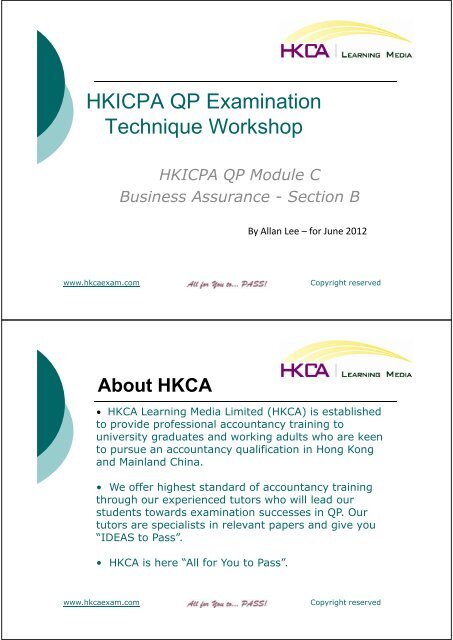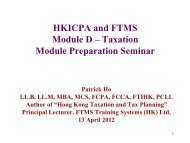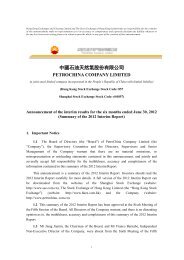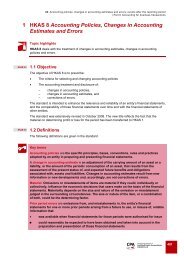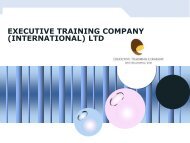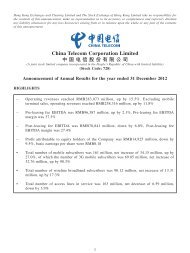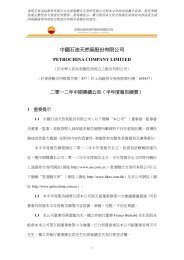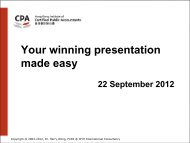HKICPA QP Examination Technique Workshop
HKICPA QP Examination Technique Workshop
HKICPA QP Examination Technique Workshop
You also want an ePaper? Increase the reach of your titles
YUMPU automatically turns print PDFs into web optimized ePapers that Google loves.
<strong>HKICPA</strong> <strong>QP</strong> <strong>Examination</strong><br />
<strong>Technique</strong> <strong>Workshop</strong><br />
<strong>HKICPA</strong> <strong>QP</strong> Module C<br />
Business Assurance - Section B<br />
By Allan Lee – for June 2012<br />
www.hkcaexam.com Copyright reserved<br />
About HKCA<br />
• HKCA Learning Media Limited (HKCA) is established<br />
to provide professional accountancy training to<br />
university graduates and working adults who are keen<br />
to pursue an accountancy qualification in Hong Kong<br />
and Mainland China.<br />
• We offer highest standard of accountancy training<br />
through our experienced tutors who will lead our<br />
students towards examination successes in <strong>QP</strong>. Our<br />
tutors are specialists in relevant papers and give you<br />
“IDEAS to Pass”.<br />
• HKCA is here “All for You to Pass”.<br />
www.hkcaexam.com Copyright reserved
About the Speaker<br />
Allan Lee<br />
Lecturer - HKCA<br />
MSc (UK), BA(Hons.), ACA, ACIS, ACS(PE), AIAS,<br />
CPA, CPA(Aust.), FCCA, M.I.H.R.M.(HK), RCC<br />
o Started his career as an auditor and was a Senior Manager responsible for Business<br />
Assurance professional exam papers of a Big Four firm in HK.<br />
o Left an international accounting firm as the Director of Learning & Development<br />
Division in 2008.<br />
o Currently manages his own training and consulting company<br />
o Has more than 10 years of extensive experience in designing, developing and<br />
delivering various kinds of learning programmes, including technical skills,<br />
leadership skills and exam skills.<br />
o An experienced facilitator and marker of <strong>HKICPA</strong> <strong>QP</strong> Modules C and D<br />
o Is the Co-chairman of the Student Affairs Subcommittee of Professional Body in<br />
Hong Kong.<br />
o As a regular speaker and writer on professional exam papers, Allan wishes to bring<br />
his expertise helping students to pass the professional exams.<br />
www.hkcaexam.com Copyright reserved<br />
孫子曰 :「知彼知己,百戰不殆。」<br />
孫子兵法《謀攻》<br />
Sun Tsu said, “If you know the enemy<br />
and know yourself, you need not fear the<br />
result of a hundred battles.”<br />
《The Art of War》<br />
www.hkcaexam.com Copyright reserved
Objectives<br />
Develop your exam techniques in<br />
<strong>HKICPA</strong> <strong>QP</strong> Module C Section B<br />
Review selected exam questions<br />
and answers – December and June<br />
2011<br />
Highlight important points to note in<br />
exams<br />
www.hkcaexam.com Copyright reserved<br />
Agenda<br />
Introduction<br />
Common Weaknesses – Exam<br />
Panelists’ comment<br />
What’s New?<br />
Exam <strong>Technique</strong>s<br />
Question Analysis<br />
Review of Selected Exam Questions<br />
Keys to Success in Exams<br />
www.hkcaexam.com Copyright reserved
Questions for You<br />
Have you completed study of your<br />
materials?<br />
Have you started practising past<br />
exam questions?<br />
Have you prepared your critical<br />
files?<br />
Have you read the examination<br />
panelists’ report?<br />
Do you have confidence to pass?<br />
www.hkcaexam.com Copyright reserved<br />
Exam Panelists’ Comment<br />
Section B (Dec 2011 session)<br />
Generally performed unsatisfactorily<br />
in Section B.<br />
Candidates should stay touch with<br />
current events and be able to apply<br />
business sense to engage more<br />
professionally in dealing with<br />
practical issues.<br />
www.hkcaexam.com Copyright reserved
Exam Panelists’ Comment<br />
Section B (Dec 2011 session)<br />
Some candidates wasted a lot of<br />
time in copying definitions and<br />
recommendations of auditing<br />
standards, some of which were<br />
irrelevant or were not required by<br />
the questions.<br />
www.hkcaexam.com Copyright reserved<br />
Exam Panelists’ Comment<br />
Section B (Dec 2011 session)<br />
Candidates should note that marks<br />
are awarded mostly on how well<br />
relevant auditing standards are<br />
applied rather than how precisely<br />
auditing standards are described.<br />
Candidates are also reminded to<br />
read the questions thoroughly in<br />
order to fully understand the exact<br />
requirements.<br />
www.hkcaexam.com Copyright reserved
Exam Panelists’ Comment<br />
Section B (Dec 2011 session)<br />
Some candidates did not present<br />
their answers in a logical and<br />
structured manner, whilst some<br />
others gave incomplete answers.<br />
Candidates are also reminded to<br />
make a reasonable attempt at<br />
answering each part of the<br />
questions.<br />
www.hkcaexam.com Copyright reserved<br />
What’s New?<br />
HK Listing Rules Appendix 14 Code<br />
on Corporate Governance (effective<br />
on 1 January 2012 or on 1 April<br />
2012<br />
To encourage better accountability of<br />
issuers and directors<br />
www.hkcaexam.com Copyright reserved
What’s New?<br />
The Anti-Money Laundering and<br />
Counter-Terriorist Financing<br />
(Financial Institutions) Bill<br />
To improve HK’s anti-money laundering<br />
(AML) regime<br />
Customer due diligence (CDD)<br />
Record keeping requirements for<br />
financial institutions<br />
www.hkcaexam.com Copyright reserved<br />
What’s New?<br />
HKSAE 3402 Assurance Reports on<br />
Controls at a Service Organisation<br />
Revised HKSIR 400 Comfort Letters<br />
and Due Diligence Meetings on<br />
Financial and Non-Financial<br />
Information (effective on or after 1<br />
January 2012)<br />
Limited assurance approach is now<br />
permitted when reporting subsequent<br />
changes<br />
www.hkcaexam.com Copyright reserved
Read Requirement<br />
Assess<br />
Comment<br />
Consider<br />
Define<br />
Describe<br />
Determine<br />
Discuss<br />
Do you concur<br />
Draft<br />
Explain<br />
Evaluate<br />
Identify<br />
List<br />
Outline<br />
State<br />
Suggest<br />
What/Why/How?<br />
www.hkcaexam.com Copyright reserved<br />
Presenting the answers<br />
Use the correct answer booklet –<br />
Section B<br />
Use headings and sub-headings to<br />
give the answer a logical flow<br />
Use paragraphs to answer questions<br />
Use clear handwriting<br />
Start each answer on a new page of<br />
the answer booklet<br />
www.hkcaexam.com Copyright reserved
Corporate Governance Questions<br />
December 2011 – Audit committee<br />
(14 marks) [Section A]<br />
June 2011 – Corporate governance<br />
improvements (9 marks)<br />
www.hkcaexam.com Copyright reserved<br />
Corporate Governance<br />
Best Practices<br />
Separation of roles of Chairman &<br />
CEO<br />
Director’s training<br />
Performance review<br />
Balanced composition of board<br />
1/3 of the board are INEDs<br />
www.hkcaexam.com Copyright reserved
Corporate Governance<br />
Best Practices<br />
Board committees<br />
Audit committee<br />
Nomination committee<br />
Remuneration committee<br />
Corporate governance committee<br />
Internal audit department<br />
www.hkcaexam.com Copyright reserved<br />
June 2011<br />
Questions 5(a) – 9 marks<br />
Three possible improvements to<br />
corporate governance<br />
Split the roles of chairman and CEO<br />
Lack of audit committee<br />
Balanced compositions of the board<br />
Elaborations in the context of the<br />
entity’s situations<br />
www.hkcaexam.com Copyright reserved
Ethics Questions<br />
December 2011 – [Section A]<br />
June 2011 – [Section A]<br />
December 2010 – [Section A]<br />
February 2010 – [Section A]<br />
May 2009 - Ethical issues (10<br />
marks)<br />
September 2008 – Independence<br />
issues (10 marks)<br />
www.hkcaexam.com Copyright reserved<br />
Ethics Questions<br />
February 2008 – [Section A]<br />
May 2007 – Independence<br />
consideration (15 marks)<br />
September 2006 – [Section A]<br />
February 2006 – Professional &<br />
ethical issues (11 marks)<br />
May 2005 – [None]<br />
September 2004 – Independence<br />
(13 marks)<br />
www.hkcaexam.com Copyright reserved
<strong>HKICPA</strong> COE (Revised)<br />
Fundamental Principles<br />
Integrity<br />
Objectivity<br />
Professional competence & due care<br />
Confidentiality<br />
Professional behaviour<br />
www.hkcaexam.com Copyright reserved<br />
<strong>HKICPA</strong> COE (Revised)<br />
Threats to Independence<br />
Self-interest threat<br />
Self-review threat<br />
Advocacy threat<br />
Familiarity threat<br />
Intimidation threat<br />
www.hkcaexam.com Copyright reserved
Dealing with Ethical Issues<br />
Use common sense<br />
Apply rules & guidelines<br />
Identify threats to independence<br />
Evaluate whether threats are<br />
insignificant (Material? Nature? Who?<br />
Role of owner interest?)<br />
If not, identify & apply safeguards<br />
Reduce the threat to acceptable level<br />
www.hkcaexam.com Copyright reserved<br />
Conceptual Approach<br />
to Independence<br />
Identify and<br />
address threats<br />
Evaluate significance<br />
of threats<br />
Apply safeguards, if<br />
applicable<br />
Accept / resign<br />
significant<br />
No<br />
Reject /Resign<br />
engagement<br />
Safeguards<br />
Threats Threats<br />
Threats<br />
To reduce threats to<br />
an acceptable level<br />
Yes<br />
insignificant<br />
Accept /<br />
Continue<br />
engagement<br />
www.hkcaexam.com Copyright reserved<br />
Reference: Code of Ethics for Professional Accountants (Revised), <strong>HKICPA</strong>
Risk & Audit Procedures<br />
December 2011<br />
Risk of material misstatements relating to<br />
valuation assertion of goodwill and intangible<br />
assets (13 marks)<br />
Risk of material misstatements of the<br />
financial statements (13 marks)<br />
June 2011<br />
Risk of material misstatements relating to<br />
valuation and allocation assertions of the<br />
overall trade receivables balance (12 marks)<br />
www.hkcaexam.com Copyright reserved<br />
Risk Assessment<br />
Financial statement level<br />
Assertion level<br />
Inherent risk<br />
Control risk<br />
Internal controls<br />
Client and engagement acceptance<br />
Change in auditors<br />
Opening balances / comparatives<br />
www.hkcaexam.com Copyright reserved
Audit Responses<br />
Audit strategy<br />
Appendix to HKSA 300 (Clarified)<br />
Audit approach<br />
Control approach<br />
Substantive approach (substantive<br />
analytical procedures & test of details)<br />
Combined approach<br />
Audit procedures<br />
8 types<br />
www.hkcaexam.com Copyright reserved<br />
Audit Procedures<br />
Analytical<br />
Procedures<br />
Confirmation<br />
Inquiry<br />
Inspection of<br />
documents /<br />
records<br />
Inspection of<br />
assets<br />
Observation<br />
Re-calculation<br />
Re-performance<br />
www.hkcaexam.com Copyright reserved
December 2011<br />
Question 7 - 13 marks<br />
Evaluate and explain the risk of<br />
material misstatement relating to<br />
the valuation assertion of goodwill<br />
and intangible assets. (4 marks)<br />
Suggest and discuss the audit<br />
procedures on goodwill and<br />
intangible assets in response to the<br />
risk assessment (9 marks)<br />
www.hkcaexam.com Copyright reserved<br />
December 2011<br />
Question 7 - 13 marks<br />
Specific risks of goodwill and<br />
intangible assets -> Specific<br />
procedures<br />
Accounting treatment of goodwill<br />
and intangible assets<br />
Not just accounting estimates and<br />
experts<br />
Annual impairment test<br />
www.hkcaexam.com Copyright reserved
December 2011<br />
Question 8 – 13 marks<br />
Re-assess the risk of material<br />
misstatement of financial<br />
statements as a whole (4 marks)<br />
Suggest and explain the audit<br />
procedures in response to the<br />
reassessed risk of material<br />
misstatements [further audit<br />
procedures] (9 marks)<br />
www.hkcaexam.com Copyright reserved<br />
December 2011<br />
Question 8 – 13 marks<br />
Subsequent event<br />
Potential recoverability problem of<br />
the receivables<br />
Going concern issue<br />
www.hkcaexam.com Copyright reserved
June 2011<br />
Question 6 – 12 marks<br />
Evaluation of the valuation and<br />
allocation assertions of the overall<br />
trade receivables balance<br />
Carrying value of trade receivables<br />
Combined audit procedures – sales and<br />
trade receivables<br />
Design, implementation and operating<br />
effectiveness of the accounting<br />
procedures and internal controls<br />
Substantive procedures<br />
www.hkcaexam.com Copyright reserved<br />
Client acceptance procedures<br />
HKSQC 1 (Clarified) Quality Control<br />
for Firms that Perform Audits and<br />
Reviews of Financial Statements,<br />
and Other Assurance and Related<br />
Services Engagements<br />
Three matters for consideration:<br />
Entity’s integrity<br />
Firm’s competence<br />
Ethical considerations<br />
www.hkcaexam.com Copyright reserved
June 2011<br />
Question 7 – 13 marks<br />
Relevant factors for the CPA firm to<br />
consider before continuing to serve<br />
as the auditor<br />
HKSQC 1 (Clarified)<br />
Three matters for consideration<br />
Elaborate the requirements by<br />
referencing the entity’s situation<br />
Possibility of threat to independence<br />
Importance of documenting the<br />
appropriate procedures and conclusions<br />
www.hkcaexam.com Copyright reserved<br />
Auditing Standards<br />
December 2011<br />
HKSA 240 (Clarified) – Fraud [Section<br />
A]<br />
June 2011<br />
HKSA 240 (Clarified) - Fraud (16 marks)<br />
www.hkcaexam.com Copyright reserved
Auditing Standards<br />
December 2010<br />
HKSA 500 (Clarified) Audit Evidence (17<br />
marks)<br />
HKSA 545 Auditing Fair Value (6 marks)<br />
HKSA 620 (Clarified) Auditor’s Expert<br />
(10 marks)<br />
February 2010<br />
HKSA 550 Related Parties (16 marks)<br />
HKSA 560 Subsequent Events (9 marks)<br />
+ Reporting (3 marks)<br />
www.hkcaexam.com Copyright reserved<br />
Auditing Standards<br />
May 2009<br />
Analytical procedures (6 marks)<br />
HKSA 240 Fraud (20 marks)<br />
September 2008<br />
HKSA 580 Management representations<br />
(10 marks)<br />
Risk management (10 marks)<br />
www.hkcaexam.com Copyright reserved
Auditing Standards<br />
February 2008<br />
Impairment loss on bad and doubtful<br />
debts (13 marks)<br />
HKSA 240 Fraud (25 marks)<br />
May 2007<br />
HKSA 550 Related Parties (13 marks)<br />
Impact of F/S and audit procedures [HKSA<br />
330] (15 marks)<br />
www.hkcaexam.com Copyright reserved<br />
Auditing Standards<br />
September 2006<br />
HKSA 530 Audit Sampling (6 marks)<br />
Audit tests (9 marks)<br />
HKSA 580 Management<br />
Representations (10 marks)<br />
HKSA 560 Subsequent Events (13<br />
marks)<br />
February 2006<br />
F/S assertions & Audit evidence (12<br />
marks)<br />
www.hkcaexam.com Copyright reserved
Auditing Standards<br />
May 2005<br />
Analytical procedures (13 marks)<br />
HKSA 550 (SAS 460) Related Parties (15<br />
marks)<br />
HKSA 545 (SAS 421) Fair Value (12<br />
marks)<br />
September 2004<br />
Fraud (10 marks)<br />
HKSA 560 (SAS 150) Subsequent events<br />
(5 marks)<br />
www.hkcaexam.com Copyright reserved<br />
Auditing Standards<br />
February 2004<br />
HKSA 570 (SAS 130) Going concern<br />
HKSA 501 (SAS 401) Inventory count<br />
HKSA 505 (SAS 402) Confirmation<br />
HKSA 540 (SAS 420) Accounting<br />
estimate<br />
HKSA 510 & 710 (SAS 450) Opening<br />
balances & comparatives<br />
HKSA 610 (SAS 500A) Internal audit<br />
www.hkcaexam.com Copyright reserved
Auditing Standards<br />
June 2003<br />
HKSA 505 (SAS 402) Confirmation<br />
HKSA 620 (SAS 520) Using the work of<br />
an expert<br />
October 2002<br />
HKSA 240 (SAS 110) Fraud and error<br />
HKSA 505 (SAS 402) Confirmation<br />
HKSA 550 (SAS 460) Related Parties<br />
www.hkcaexam.com Copyright reserved<br />
June 2011<br />
Question 5(b) – 6 marks<br />
Auditor’s responsibilities for<br />
preventing and detecting frauds in<br />
financial statements<br />
HKSA 240 (Clarified) The Auditor’s<br />
Responsibilities Relating to Fraud in an<br />
Audit of Financial Statements<br />
Inherent limitations and unavoidable<br />
risks of auditing<br />
www.hkcaexam.com Copyright reserved
June 2011<br />
Question 5(b) – 6 marks<br />
Three pre-requisites<br />
An incentive or pressure to commit<br />
fraud<br />
A perceived opportunity to commit<br />
fraud<br />
Some rationalization of the fraudulent<br />
act<br />
www.hkcaexam.com Copyright reserved<br />
June 2011<br />
Question 5(c) – 10 marks<br />
Discuss three fraud risk factors as<br />
improvements to corporate<br />
governance<br />
Desire for a listing<br />
Rapid growth and unusual profitability<br />
Questionable liquidity<br />
www.hkcaexam.com Copyright reserved
Reporting<br />
December 2011<br />
Auditor’s report – Modified opinion,<br />
REIT [Section A]<br />
June 2011 (None)<br />
December 2010<br />
Audit opinion on disclosure requirement<br />
(small part only)<br />
www.hkcaexam.com Copyright reserved<br />
Reporting<br />
February 2010<br />
HKSRS 4400 - Report of Factual<br />
Findings (8 marks)<br />
HKSA 701 – Subsequent events (3<br />
marks)<br />
May 2009 (None)<br />
www.hkcaexam.com Copyright reserved
Reporting<br />
September 2008<br />
Auditor’s report – going concern [HKSA<br />
570] (12 marks)<br />
HKSRE 2410 – Interim financial report<br />
[Section A]<br />
February 2008<br />
Auditor’s report – going concern<br />
[Section A]<br />
May 2007 (None)<br />
www.hkcaexam.com Copyright reserved<br />
Reporting<br />
September 2006 (None)<br />
February 2006<br />
HKSA 701 (SAS 600) Auditors’ Report<br />
(14 marks)<br />
May 2005 (None)<br />
September 2004<br />
Auditors’ Report – Subsequent events<br />
(8 marks)<br />
www.hkcaexam.com Copyright reserved
Auditors’ Opinion<br />
Unmodified [HKSA 700 (Clarified)]<br />
Modified [HKSA 705 (Clarified)]<br />
Limitation on scope – qualified /<br />
disclaimer of opinion<br />
Disagreement – qualified / adverse<br />
opinion<br />
Additional Communication [HKSA<br />
706 (Clarified)]<br />
Emphasis of matter paragraphs<br />
Other matter paragraphs<br />
www.hkcaexam.com Copyright reserved<br />
Computerized Business Systems<br />
Discuss the features of a<br />
computerized business system<br />
Assess and advise on risk on control<br />
frameworks<br />
www.hkcaexam.com Copyright reserved
Computerized Business Systems<br />
New Learning Outcomes (Enhanced <strong>QP</strong>)<br />
Impact of increasing use and share of<br />
ownership by accountants in corporate<br />
information system<br />
Impact of e-commerce<br />
Opportunities and threats to corporate<br />
information system - capabilities in data<br />
treatment and analysis, data integrity,<br />
system security and issues in access<br />
restriction, and business contingency/<br />
continuity<br />
www.hkcaexam.com Copyright reserved<br />
Computerized Business Systems<br />
December 2011 – IT controls (6<br />
marks) & audit approach and procedures<br />
on IT (18 marks)<br />
June 2011<br />
December 2010 - System conversion<br />
approaches (5 marks) & Security controls<br />
(12 marks)<br />
www.hkcaexam.com Copyright reserved
Computerized Business Systems<br />
February 2010 - Internal controls:<br />
software development & management of<br />
IT assets (14 marks)<br />
May 2009 - Use of IT in audit, CAAT (14<br />
marks)<br />
September 2008 - Internal controls:<br />
database environment (8 marks)<br />
February 2008 – E-commerce:<br />
business risks & IC [PN1013] (12 marks)<br />
www.hkcaexam.com Copyright reserved<br />
Computerized Business Systems<br />
May 2007 – System weaknesses &<br />
recommendations (7 marks)<br />
September 2006 – Impact of IT on<br />
audit (12 marks)<br />
February 2006 – Online system /<br />
standalone PC (13 marks)<br />
May 2005 – Characteristics of online IS<br />
& security measures (10 marks)<br />
www.hkcaexam.com Copyright reserved
Computerized Business Systems<br />
September 2004 – Tests of controls &<br />
CAAT on inventory balance (14 marks)<br />
February 2004 – CIS environment (10<br />
marks)<br />
June 2003 – System conversion method<br />
& reliability of new system (10 marks)<br />
October 2002 – Disaster recovery plan<br />
(9 marks)<br />
www.hkcaexam.com Copyright reserved<br />
December 2011<br />
Question 6(a) - 6 marks<br />
Identify and explain the two types<br />
of IT controls that are usually in<br />
place when the system is<br />
computerized.<br />
Basic concepts of computer controls<br />
General IT controls<br />
Application controls<br />
www.hkcaexam.com Copyright reserved
December 2011<br />
Question 6(b) - 18 marks<br />
Determine the most appropriate<br />
audit approach for testing data<br />
integrity and reliability<br />
Design and explain the audit<br />
procedures for an IT general<br />
controls test and data reliability test<br />
2 cases – 9 marks for each case<br />
www.hkcaexam.com Copyright reserved<br />
Exam Panelists’ Comment<br />
Overall (Dec 2011 session)<br />
Should pay attention to the question<br />
requirements and structure their answers in<br />
a more systematic manner<br />
Should not copy directly from the study<br />
materials<br />
Need to use their analytical skill-set, digest<br />
and apply the relevant audit standards and<br />
knowledge to the situations in the<br />
questions<br />
Use plain English<br />
Write legibly<br />
www.hkcaexam.com Copyright reserved
Keys to Success in Exams<br />
Preparation<br />
Study the basics of auditing<br />
Read Exam Panelists’ reports<br />
Practise questions<br />
Manage time well<br />
www.hkcaexam.com Copyright reserved<br />
Keys to Success in Exams<br />
<strong>Examination</strong><br />
Keep calm<br />
Read the requirements first<br />
Select the order of questions and<br />
allocate time for questions<br />
Attempt all questions and answer<br />
relevantly<br />
Manage time well<br />
www.hkcaexam.com Copyright reserved
www.hkcaexam.com Copyright reserved<br />
Thank You Very Much!<br />
Good Luck!<br />
www.hkcaexam.com Copyright reserved 66
Contact<br />
Email: info@hkcaexam.com<br />
Website: www.hkcaexam.com<br />
Tel: (852) 3107-0088<br />
www.hkcaexam.com Copyright reserved<br />
www.hkcaexam.com Copyright reserved


